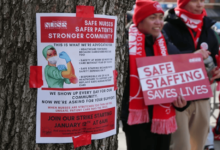Causes of death to be further scrutinised in wake of Letby case

The government has introduced reforms which will change how patient deaths are certified, in the wake of the Lucy Letby case.
From September this year, medical examiners will look at the cause of death in all cases that have not been referred to the coroner, as part of a move that aims to provide greater transparency to bereaved people and help protect the public.
Medical examiners are senior medical doctors who already scrutinise the majority of deaths in England and Wales.
The Department of Health and Social Care (DHSC) announced today that, from 9 September, it will become a statutory requirement that all deaths in any health setting that are not referred to the coroner in the first instance are subject to medical examiner scrutiny.
This will provide families or representatives of the deceased with an opportunity for them to raise any questions or concerns with a senior clinician not involved in the care of the person who died.
The DHSC said that the changes would ensure that the right deaths were referred to coroners for investigation.
Health minister Maria Caulfield said: “Reforming death certification is a highly complex and sensitive process, so it was important for us to make sure we got these changes right.
“At such a difficult time, it’s vital that bereaved families have full faith in how the death of their loved one is certified and have their voices heard if they are concerned in any way,” she said.
“The measures I’m introducing today will ensure all deaths are reviewed and the bereaved are fully informed, making the system safer by improving protections against rare abuses.”
Responding to the announcement, the deputy director of professional regulation at the Nursing and Midwifery Council, Paul Johnson, said: “As part of the health and care safety system, we welcome any steps towards greater transparency for bereaved families with an appropriate opportunity to raise concerns.
“Should a medical examiner’s work lead to a concern being raised with us, then like with all concerns, we would carefully consider what action we may need to take to protect the public and to maintain trust in our professions.”
The reforms aim to strengthen safeguards and prevent criminal activity among healthcare staff, according to the DHSC.
The government said that recent cases, such as Lucy Letby’s, highlighted the need for an additional layer of scrutiny into patient deaths.
The former neonatal nurse was given a whole-life sentence last year after she was found guilty of murdering seven babies and attempting to murder six others while she worked at the Countess of Chester Hospital.
During Letby’s trial, the court heard that concerns were raised multiple times about the former neonatal nurse, but that these were ignored by hospital managers.
Following her conviction, the Thirlwall Inquiry was launched to investigate how Letby was able to murder and harm multiple babies.
The inquiry will also examine how the Countess of Chester Hospital NHS Foundation Trust dealt with concerns raised about Letby.
Separately, the DHSC announced today that it would be reviewing how patients and their families were kept informed when healthcare goes wrong.
A new call for evidence, launched today, will run for six weeks and aims to capture views about how the duty of candour system is honoured, monitored and enforced in health and social care settings.
The duty of candour requires health and care providers to be open and honest when things go wrong, and entitles patients and families with a right to receive explanations for what happened as soon as possible and a meaningful apology.

Maria Caulfield
Ms Caulfield added: “I spent 20 years working as a nurse in the NHS, and I know how important it is that health and care providers are open with patients and their loved ones – especially if something has gone wrong.
“I want to ensure that our system of duty of candour is kept up to date, so I urge anyone with views or experience to respond to the call for evidence to help inform our review, which will ensure that honesty and integrity remain at the heart of our health and social care services.”
Patient safety commissioner Henrietta Hughes said: “I welcome the fact that duty of candour is being reviewed because it is important that people do not struggle to get information when something has gone wrong.
“Working with patients as partners is an opportunity for us to learn and improve,” she said. ‘I would urge the public and clinicians to respond to this call for evidence.”







